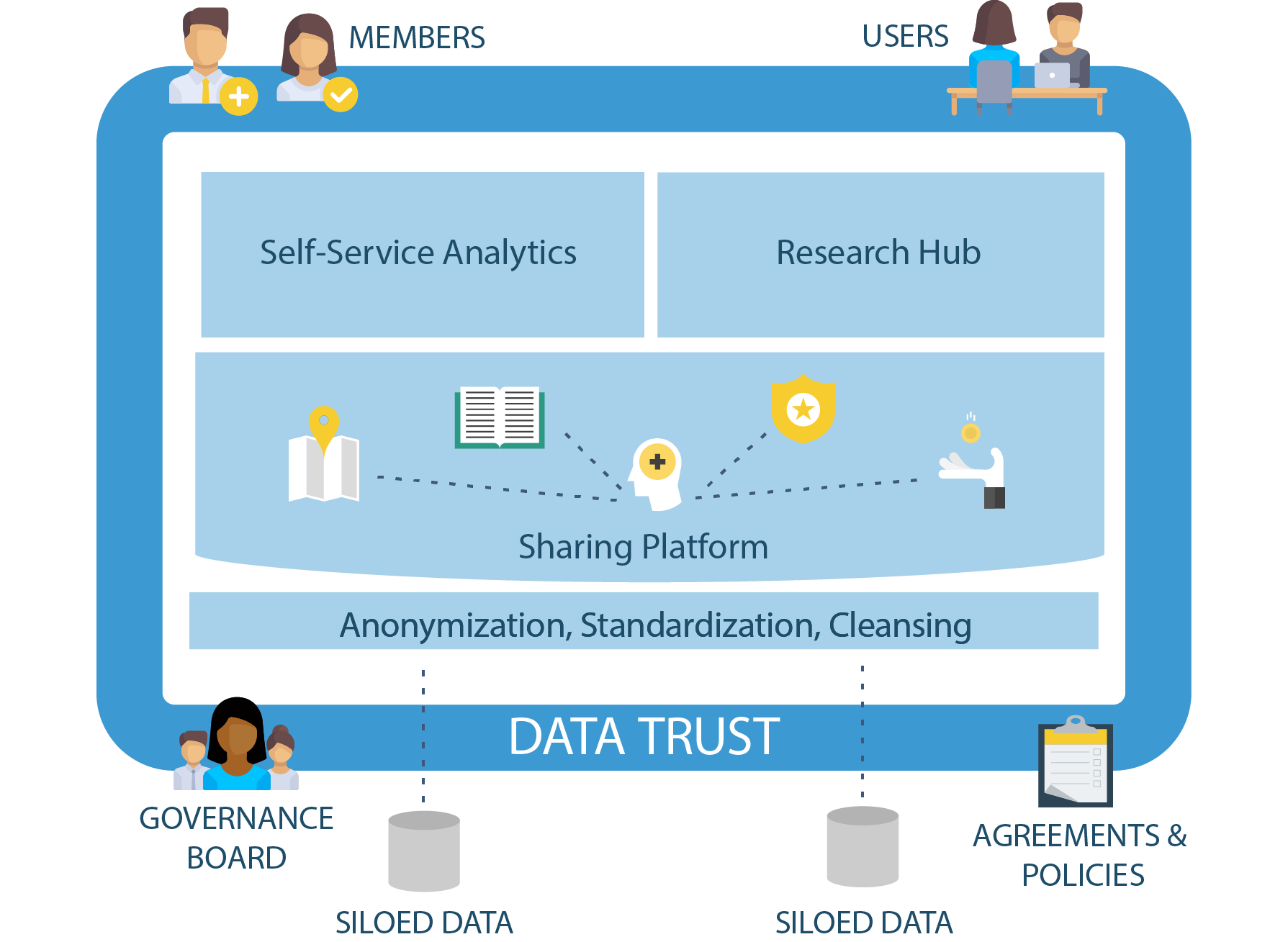What is a Data Trust?
What is a Data Trust?
A data trust is a legal framework that enables organizations to securely connect their data sources and create a new shared repository of data. The data trust standardizes and formalizes the relationships between the organizations that are contributing or accessing data within the repository. As a scalable alternative to multiple “point-to-point” sharing, a data trust promotes collaboration among its members through common rules for data security, privacy, and confidentiality.
Ultimately, a data trust lays the groundwork for a successful enterprise analytics programs.
Building an Impactful Data Trust
Data sharing can transform organizations and exponentially increase the impact of their work. A data trust is a fundamental component of any data sharing initiative and must be crafted to address the specific circumstances of the participating organizations. While there is no universal formula for building a data trust, Qlarion’s data trusts include these critical components:
- Data Trust Agreement – A legal document that outlines the responsibilities and expectations of entities that contribute data to the data trust. There are distinct versions of the agreement for members (entities that contribute data) and users (organizations or individuals who access the data including for research purposes).
- Data Sharing Platform – A secure, scalable data repository that houses all shared data
- Research Hub – An on-line portal within the Data Sharing platform providing approved Third-Party Researchers access to managed data resources
- Self-Service Analytics – Pre-made dashboards and tools that allow members and users to profile and analyze data quickly
- Data Governance Board – A decision-making body made up of select trust members that manages the data trust and ensures that it continues to adhere to data trust agreement

The Benefits of a Data Trust for Government Agencies
Data sharing across agencies can help government leaders and policy makers enhance collaboration, measure program impact, answer business questions and better respond to the needs of constituents. Unfortunately, data is often siloed, stored in a wide range of formats, and restricted in use. Without a central data repository, government leaders don’t have the full picture needed to best support their communities. A well-crafted data trust eliminates the most common obstacles to scalable data collaboration, namely:
- Data inconsistency – Most agencies have distinct data formats, definitions, update frequencies
- System inconsistency – Data is collected, stored and analyzed by a variety of different software programs, which makes integration complicated
- Stakeholder concerns – Discussions around data sharing can become adversarial as stakeholders voice concerns around privacy, security, and liability.
A data trust helps agencies overcome these problems by establishing common rules for data security, privacy, and confidentiality: what data is shared, how it is shared, who can contribute data, and who can access data. It also creates clear, scalable data intake processes for securely uploading data from multiple sources into a single repository, reducing technical costs.
Case Study: A Transformative Data Trust
Since 2017 Qlarion has been supporting the Commonwealth of Virginia’s data analytics initiatives. We collaborated with leaders from multiple agencies to establish the Commonwealth Data Trust and Data Sharing Environment, which empowers data discovery and analytics for organizations statewide.
The data trust serves as the cornerstone of Virginia’s Framework for Addiction Analysis and Community Transformation (FAACT), a secure data-sharing platform led by the Department of Criminal Justice Services (DCJS) in collaboration with Virginia’s chief data officer (CDO). It combines previously siloed data from different agencies, secretariats, localities, social services, public safety and corrections, drug courts, community coalitions and private healthcare systems. FAACT has been critical in the Commonwealth’s response the opioid epidemic, and was recently expanded to inform in response to COVID-19.
You can learn more about the role of the data trust in Virginia’s data analytics programs here.

